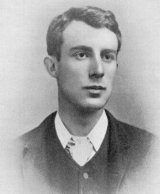The Banished Bejant
Robert Fuller Murray 1863 – 1894
from the unpublished remains of Edgar Allan Poe
In the oldest of our alleys,
By good bejants tenanted,
Once a man whose name was Wallace—
William Wallace—reared his head.
Rowdy Bejant in the college
He was styled:
Never had these halls of knowledge
Welcomed waster half so wild!
Tassel blue and long and silken
From his cap did float and flow
(This was cast into the Swilcan
Two months ago);
And every gentle air that sported
With his red gown,
Displayed a suit of clothes, reported
The most alarming in the town.
Wanderers in that ancient alley
Through his luminous window saw
Spirits come continually
From a case well packed with straw,
Just behind the chair where, sitting
With air serene,
And in a blazer loosely fitting,
The owner of the bunk was seen.
And all with cards and counters straying
Was the place littered o'er,
With which sat playing, playing, playing,
And wrangling evermore,
A group of fellows, whose chief function
Was to proclaim,
In voices of surpassing unction,
Their luck and losses in the game.
But stately things, in robes of learning,
Discussed one day the bejant's fate:
Ah, let us mourn him unreturning,
For they resolved to rusticate!
And now the glory he inherits,
Thus dished and doomed,
Is largely founded on the merits
Of the Old Tom consumed.
And wanderers, now, within that alley
Through the half-open shutters see,
Old crones, that talk continually
In a discordant minor key:
While, with a kind of nervous shiver,
Past the front door,
His former set go by for ever,
But knock—or ring—no more.
Font size:
Submitted on May 13, 2011
Modified on April 03, 2023
- 1:20 min read
- 75 Views
Quick analysis:
| Scheme | A XBXBXBXB CACABDBD EFEFGHGH GIGJCKCK GBGBLBLB EEEEIJIJ |
|---|---|
| Closest metre | Iambic tetrameter |
| Characters | 1,497 |
| Words | 267 |
| Stanzas | 7 |
| Stanza Lengths | 1, 8, 8, 8, 8, 8, 8 |
Translation
Find a translation for this poem in other languages:
Select another language:
- - Select -
- 简体中文 (Chinese - Simplified)
- 繁體中文 (Chinese - Traditional)
- Español (Spanish)
- Esperanto (Esperanto)
- 日本語 (Japanese)
- Português (Portuguese)
- Deutsch (German)
- العربية (Arabic)
- Français (French)
- Русский (Russian)
- ಕನ್ನಡ (Kannada)
- 한국어 (Korean)
- עברית (Hebrew)
- Gaeilge (Irish)
- Українська (Ukrainian)
- اردو (Urdu)
- Magyar (Hungarian)
- मानक हिन्दी (Hindi)
- Indonesia (Indonesian)
- Italiano (Italian)
- தமிழ் (Tamil)
- Türkçe (Turkish)
- తెలుగు (Telugu)
- ภาษาไทย (Thai)
- Tiếng Việt (Vietnamese)
- Čeština (Czech)
- Polski (Polish)
- Bahasa Indonesia (Indonesian)
- Românește (Romanian)
- Nederlands (Dutch)
- Ελληνικά (Greek)
- Latinum (Latin)
- Svenska (Swedish)
- Dansk (Danish)
- Suomi (Finnish)
- فارسی (Persian)
- ייִדיש (Yiddish)
- հայերեն (Armenian)
- Norsk (Norwegian)
- English (English)
Citation
Use the citation below to add this poem to your bibliography:
Style:MLAChicagoAPA
"The Banished Bejant" Poetry.com. STANDS4 LLC, 2024. Web. 19 Apr. 2024. <https://www.poetry.com/poem/31038/the-banished-bejant>.



Discuss the poem The Banished Bejant with the community...
Report Comment
We're doing our best to make sure our content is useful, accurate and safe.
If by any chance you spot an inappropriate comment while navigating through our website please use this form to let us know, and we'll take care of it shortly.
Attachment
You need to be logged in to favorite.
Log In